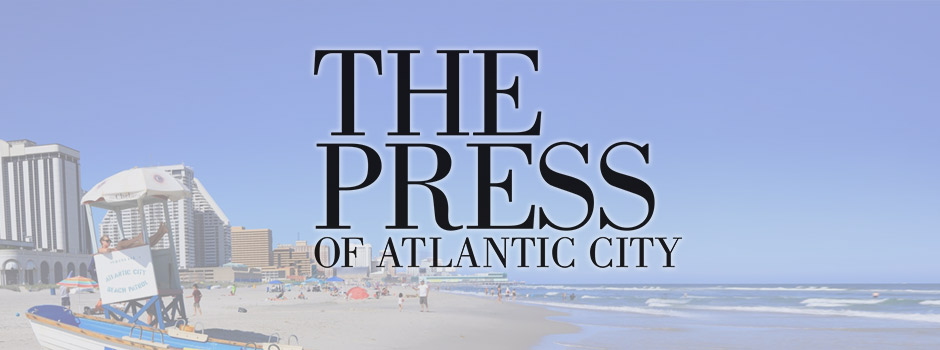Atlantic City Enters Era Of Green Investment

Atlantic City, NJ (May 16, 2023) – Christina Casile stands in the lobby of Design 710 at 112 Park Place, the latest cannabis business to open in the resort.
Behind her is an enormous display screen showing a loop of colorful digital smoke and the words “Atlantic City.” The dispensary is loaded with eye-catching touches, including rotating panels that separate the lobby from the dispensary area, with designs from old Atlantic City on one side and display shelves on the other.
The site had been long vacant office space, which Casile and her business partner Ted Flowers described as moldy and in otherwise terrible condition. Casile, whose background is in design, said the company invested about $1.5 million in improving the site, which they lease. On the other side of a wall is another 8,000 square feet of possible expansion space if the new business takes off.
It seems like exactly the kind of investment Atlantic City officials have in mind when they talk about the potential for the new cannabis industry in the resort.
“We’re trying to position Atlantic City as the cannabis hub for the East Coast,” said Kashawn “Kash” McKinley, the city’s director of constituent services, who also leads the city’s Cannabis Review Board, which advises Mayor Marty Small Sr. on cannabis-related issues.
Early indications look promising, with multiple potential cannabis businesses seeking state licenses to open in the city and more on the way. About $35 million in new investment is expected as part of two large-scale cannabis businesses in town, and MPX NJ, which became the city’s first business open to the recreational cannabis market on New York Avenue on April 20, is building a new and bigger structure right behind the current location.
There have been multiple other proposals to seek, and receive, planning approval for cannabis businesses, and two more are on the agenda for the Tuesday meeting of the Casino Reinvestment Development Authority: Honeybuzz Farms for a micro-dispensary at 1724 Atlantic Ave. and Everest Dispensary, seeking the OK to sell weed to the adult use market at 1226 Atlantic Ave.
Last year, the city approved a “green zone” that includes much of the commercial area of town, where cannabis businesses are an approved use. The plan is to encourage the businesses, and the potential for jobs and money coming to the city.
There are more than a dozen cannabis businesses in the works in Atlantic City, with many awaiting needed state license approvals from the New Jersey Cannabis Regulatory Commission.
That includes Casile and her business partner and childhood friend Nicole Stermer at Design 710, which they describe as the Jersey Shore’s first women-owned cannabis business. The business is currently open only for those with medical marijuana cards.
They have applied for an adult-use license, which Casile hopes to have in hand this summer.
She expects summer to be the busiest time for Design 710, named for a designation for concentrates. Much like 420 is used to indicate cannabis, the number 710, which spells “oil” upside down, has also been used.
Casile said few in her design business got the reference, but many did immediately within the cannabis community.
The city’s first legal dispensary, The Botanist, has applied to the NJCRC for permission to relocate out of Atlantic City. The business is on the Boardwalk, the only commercial area where the city has said no to cannabis.
Casile hopes to pick up some of those customers once the move is approved.
In some respects, New Jersey’s closely regulated cannabis industry has been slow to get off the ground, or at least slower than some investors had hoped, said Scott Rudder, who is back as the head of the New Jersey CannaBusiness Association after several years with Edmund DeVeaux at the helm.
Rudder said the industry is doing well, especially in comparison to other states that have legalized cannabis for adults. Sales are increasing, and as more retail locations and growing facilities are licensed, those increases will continue. He expects cannabis to be a $2 billion to $3 billion industry, he said, and with its influx of visitors each year, he believes Atlantic City may be in a good position to lay claim to some of that money.
The city is also one of the few beach resorts that has been listed as an impact zone under the state’s cannabis laws, meaning areas where the state wants to direct the benefits of a cannabis industry.
The Cannabis Regulatory Commission has sought to prioritize licenses in impact zones, and for businesses owned by women, minorities and veterans over large-scale operators from out of state.
The trick is funding, Rudder said.
With marijuana still listed by the federal government as a schedule 1 narcotic, cannabis start-ups have no hope of getting funding through programs such as the Small Business Administration and many large banks remain wary of any connection to the industry.
“Everybody has dreams,” said Flowers at Design 710. “Some of the people we encounter, they have a great name, a great theme, but they don’t understand the investment and the headaches of dealing with the regulatory scheme.”
MPX did not respond to questions about their level of investment in Atlantic City. Rudder said it is difficult to generalize, because of the dramatic range in rents and purchase prices in New Jersey, but anyone trying to launch a cannabis business would need at least hundreds of thousands of dollars to get started.
That may change if a much-discussed federal bill on cannabis and banking makes progress, but for now, new businesses must look harder for investments, especially with interest rates and inflation continuing to climb.
In 2017, money was flying toward cannabis, he said. Now, potential investors are much more careful.
“You don’t want to be in a position where you have to lay off employees before you even get started,” Rudder said.
Design 710 is close to High Roller Dispensary LLC, planning to open a large dispensary and lounge in the Claridge Hotel near the Boardwalk. That project is also working toward a full state license. Flowers said the more cannabis businesses the better, as it will help “normalize” cannabis sales and offer customers additional choices.
Casile wants to be one of the first open, to set the bar for future businesses.
“I think that’s huge,” she said.
Casino gaming looks set to remain the main economic driver for the city, bringing in millions of dollars every month. Cannabis investors don’t expect to overtake gaming, but see potential in the city.
“Atlantic City has always been an exciting opportunity,” Rudder said. He’s heard proposals for cannabis-centric hotels, along with consumption lounges and dispensaries. There are already cannabis events, such as the annual 420 festival. The city’s cannabis businesses will have to do more than sell weed. They’ll need to offer visitors an experience, Rudder said.
“Everybody I speak with in Atlantic City, they want to cater to the tourist crowd,” he said.
By: Bill Barlow
 Governor Phil Murphy • Lt. Governor Tahesha L. Way
Governor Phil Murphy • Lt. Governor Tahesha L. Way



